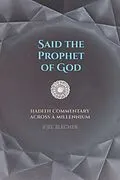Although scholars have long studied how Muslims authenticated and transmitted Muhammad's sayings and practices (hadith), the story of how they interpreted and reinterpreted the meanings of hadith over the past millennium has yet to be told. Joel Blecher takes up this charge, illuminating the rich social and intellectual history of hadith commentary at three critical moments and locales: classical Andalusia, medieval Egypt, and modern India. Weaving together tales of public debates, high court rivalries, and colonial politics with analyses of ethnographic field notes and fine-grained arguments adorning the margins of manuscripts, Said the Prophet of God offers new avenues for the study of religion, history, anthropology, and law.
Autorentext
Joel Blecher is Assistant Professor of History at George Washington University. His writings have appeared in the Journal of Near Eastern Studies, Oriens, and the Atlantic.
Inhalt
List of Illustrations
Note on Transliteration and Conventions
Introduction
I. ANDALUSIA IN THE LAST DAYS OF THE UMAYYADS
1. The Perils of Public Commentary
2. The Inner World of the Interpretive Tradition
II. EGYPT AND SYRIA UNDER THE MAMLUKS
3. For Sultans, Students, and Scholars
4. Rivalry and Revision in the Manuscript Age
5. Oratory in the Shade of the Sultan's Garden
6. Gatekeepers of the Law
7. Mysteries of the Thresholds
8. The Art of Concision
III. EARLY MODERN INDIA AND BEYOND
9. Trustees across the Ocean: Gujarat to Deoband to Bhopal
10. Lost in Translation: Arabic to Urdu to English
Epilogue: Islamism, ISIS, and the Politics of Interpretation
Acknowledgments
Notes
Works Cited
Index of Names and Titles
Index of Subjects and Terms
